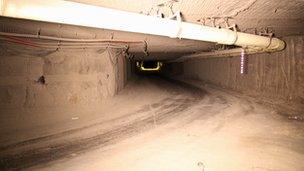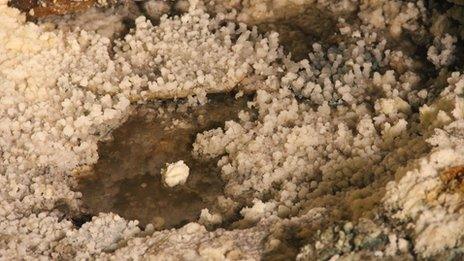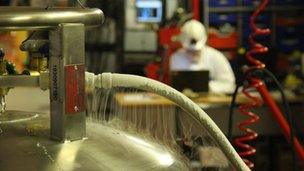Boulby mine: Underground life gives alien clues
- Published
Prof Charles Cockell explains why microbes living deep underground could tell us more about the potential for life on other planets
Learning whether extraterrestrial life exists is one of the biggest challenges of science - but now a mine in the north-east of England could hold the key. Researchers believe studying the tiny organisms living deep underground could help them to understand whether life could thrive beyond the Earth.
We plunge into darkness as we start the descent into the mine.
Crammed into a cage, it takes just a few minutes to make the journey more than 1km (0.6 mile) down.
As we emerge, kitted out with hard hats, head-torches and emergency breathing gear, the heat hits like a wall - temperatures in parts of the mine can reach more than 35C.

Salt and potash have been extracted from Boulby mine since the 1970s
The Boulby Mine, operated by Cleveland Potash Ltd, external, is one of the deepest in Europe and it stretches across North Yorkshire and the Cleveland and Redcar Borders.
The miners start to make their way through the network of tunnels to begin their shifts. Since the 1970s, potash and salt have been extracted from the ground, but the rocks here also hold something more.
Although the dusty terrain looks barren it is packed with tiny organisms.
Life in extremes
Professor Charles Cockell, from the UK Centre for Astrobiology, external at the University of Edinburgh, says: "We have got very extreme conditions from the point of view of life.
"This is a very salty environment, it's very dark, which means there's no sunlight for energy, and there is very little water.
"So making a living deep underground here is very difficult for most life, and we are interested in trying to find out how life can survive and even thrive in an environment like this."
The microbes, too small to see with the naked eye, are called extremophiles, and Professor Cockell and his team have come here to take samples to learn more about them.

The salty environment in Boulby is similar to that of other planets such as Mars
Studying these, he says, could tell us whether life could cope in other similar environments elsewhere in the Universe.
"If you look on Mars, you find table salt on the surface of that planet - sodium chloride brine seeps," Prof Cockell explains.
"If you look at Europa, one of the moons of Jupiter, you find a salty ocean beneath an icy crust.
"There are salts everywhere in the Universe. If you want to understand whether life might be able to originate and grow in some of the extraterrestrial environments, and assess them as abodes for life, you need to come to a dark salty environment."
Using our torches to light the way, we head to the on-site laboratory.
It is in stark contrast to the rest of the mine: we step into a bright white room full of gleaming scientific instruments.
This lab has been running here for years and is the result of a collaboration between the Science and Technology Facilities Council, external and the mining company.
Dr Sean Paling, director of the Boulby Underground Laboratory, external, says: "It is unusual to have a lab like this is a mine. It's even unusual to the miners - they can't quite believe we have this here."
Until recently, research here has focussed on the hunt for dark matter: the mysterious particles thought to make up about a quarter of the Universe. But the team is now broadening its research.
"The reason we came down here for this astronomy is because it is a very, very quiet environment," Dr Paling explains.
"There is very little interference down here from natural radiation - the particles you get on the surface.
"But there are lots of other projects you can do in such an environment. We have a climate research project, various radio-dating studies, a carbon capture and research study, and now also the astrobiology laboratory."

For years, research in the mine focussed on the hunt for dark matter
He adds: "It does seem like a contradiction in a way - you have these big questions about what the Universe is made of and is there life on other planets and what that life is like. And yet, here we are studying it underground, but that is absolutely what's happening. This sort of environment allows you to do that sort of study extremely well."
It's early days, but genetic tests are already revealing that the mine harbours unusual species.
And while the hope is that one day we might find intelligent, advanced extraterrestrial life, the chances are that any alien species could be more like the simple organisms living in the mine.
Prof Charles Cockell says: "Is there life elsewhere in the Universe is undoubtedly one of the most exciting questions in science.
"So the search for extreme life in Boulby is not some sort of wild optimistic hope of finding life elsewhere. It gives us a scientific basis of understanding whether there is life in the Universe, and if it is there, whether it is similar to Earth life, and if it's not, why it's not."
- Published15 July 2013
- Published2 July 2013